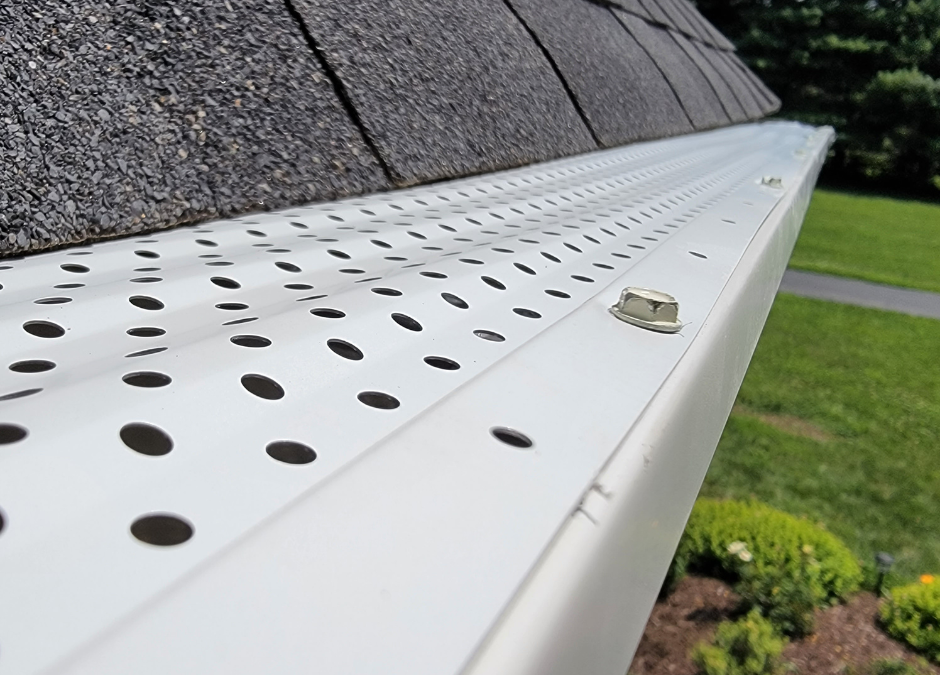Maintaining the integrity of your home’s gutter system is essential for protecting your property from water damage. One of the most effective tools in preventing debris from clogging your gutters is the installation of gutter guards. At Tiger Gutters in Memphis, TN, we understand how important it is for homeowners to make informed decisions about their gutter systems. In this blog post, we will provide an in-depth look at gutter guards, explaining their purpose, types, benefits, and potential limitations—all without making any specific promises or service commitments.
What Are Gutter Guards?
Gutter guards are protective covers installed over gutters to prevent debris like leaves, twigs, and dirt from entering the system while allowing rainwater to flow through. Their primary function is to reduce the frequency of gutter cleaning and ensure that water is efficiently channeled away from your home’s foundation.
Gutter guards are available in a variety of designs, each suited to different climates and debris conditions. While they can be a valuable addition to any gutter system, it’s important to choose the right type of guard for your specific needs.
Types of Gutter Guards
There are several types of gutter guards on the market, each offering unique advantages based on their design and materials:
1. Screen Gutter Guards
Screen gutter guards are one of the most common and affordable options. Made from wire or plastic mesh, these guards are designed to fit over the top of your gutters and filter out larger debris like leaves and twigs. While screens do a good job of blocking larger debris, smaller particles may still pass through, meaning occasional cleaning might still be necessary.
2. Mesh Gutter Guards
Similar to screen guards, mesh gutter guards offer a finer filtration system that blocks even smaller debris, such as pine needles and roof grit. Made from metal or plastic, these guards can vary in durability and are a popular option in areas with a lot of small, windblown debris.
3. Reverse Curve Gutter Guards
Reverse curve gutter guards work by directing water downward into the gutter while causing debris to slide off the roof’s edge. These guards are typically more expensive and often require professional installation. While effective, they can sometimes cause issues in heavy downpours if water flows too quickly to follow the curve.
4. Brush Gutter Guards
Brush guards resemble large pipe cleaners and are placed inside the gutter. They allow water to pass through while trapping debris on top. Brush guards are easy to install, but like screens, they may still require periodic cleaning to remove trapped leaves or other materials that accumulate on the brushes.
5. Foam Gutter Guards
Foam guards are made from porous foam that fits inside the gutter. Water is absorbed through the foam while debris sits on top. While these guards can be effective, they may degrade over time due to exposure to the elements, and their performance can diminish as they become clogged with debris.
Benefits of Gutter Guards
Adding gutter guards to your home’s gutter system can provide a range of benefits. Here are some of the most notable advantages:
1. Reduced Maintenance
One of the biggest benefits of gutter guards is the reduction in maintenance they offer. By preventing debris from accumulating in the gutters, homeowners may not need to clean their gutters as frequently. This can save time, effort, and potentially reduce the risk of accidents associated with climbing ladders to clean out gutters.
2. Prevention of Clogs and Water Damage
Gutter clogs can lead to serious water damage. When gutters are blocked, water can overflow and pool around the foundation, leading to erosion, basement flooding, or damage to the landscaping. Gutter guards help ensure that water flows freely through the system, reducing the likelihood of these problems.
3. Prolonged Gutter Lifespan
When debris is constantly accumulating in gutters, it can cause them to become weighed down and sag, leading to potential damage. Additionally, standing water in clogged gutters can cause rust and corrosion in metal gutters. By keeping debris out, gutter guards may help extend the life of the gutters themselves.
4. Pest Prevention
Gutters filled with leaves and stagnant water can become breeding grounds for pests such as mosquitoes, birds, and rodents. Gutter guards help to eliminate this issue by reducing the buildup of debris and standing water, making gutters less attractive to these pests.
5. Improved Water Flow for Rainwater Harvesting
For homeowners who collect rainwater, keeping gutters clean and free-flowing is essential to maximize water collection. Gutter guards help by preventing contaminants from entering the water system, improving the quality of the collected water.
Limitations of Gutter Guards
While gutter guards offer numerous benefits, it’s important to be aware of their potential limitations as well. Here are a few considerations:
1. Initial Investment
Gutter guards can represent a significant upfront investment, especially for higher-end products like reverse curve or mesh guards. Although they may reduce the need for regular cleaning, homeowners should weigh the initial cost against the long-term benefits.
2. Not Completely Maintenance-Free
Despite their effectiveness in reducing the amount of debris that enters your gutters, gutter guards are not entirely maintenance-free. Some debris can still accumulate on top of the guards, requiring occasional cleaning to ensure the system continues to function efficiently.
3. Installation Challenges
Certain types of gutter guards, such as reverse curve or mesh guards, may require professional installation to ensure they work correctly. Improper installation could lead to water flowing over the gutters rather than into them, potentially causing damage to the home.
Are Gutter Guards Right for You?
When considering whether gutter guards are a good investment for your home, it’s important to evaluate the specific conditions around your property. Factors such as the types of trees near your home, the amount of rainfall in your area, and the condition of your current gutters should all play a role in your decision. Additionally, it’s essential to remember that gutter guards are not a one-size-fits-all solution, and the right product will depend on your unique circumstances.
Conclusion
Gutter guards can be a valuable addition to your home’s gutter system, helping to reduce maintenance, prevent clogs, and protect your property from water damage. However, as with any home improvement, it’s important to thoroughly research your options before making a decision. At Tiger Gutters in Memphis, TN, we believe in empowering homeowners with the information they need to maintain and protect their homes. Whether you’re exploring the benefits of gutter guards or looking for ways to enhance your gutter system, staying informed is key to making the right choice for your home.
This blog post is intended to provide general information about gutter guards and is not a promise of specific services or products. Always consult with a professional for advice tailored to your specific situation.

